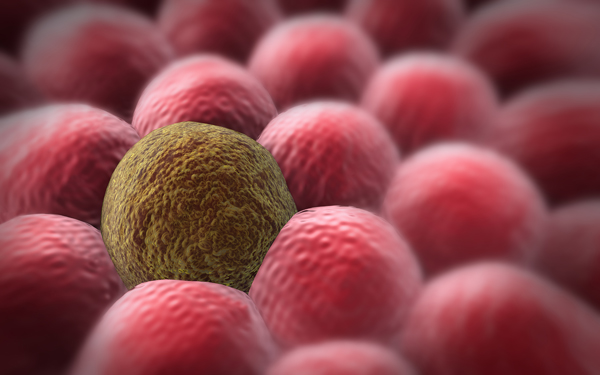Scientists at the Mayo Clinic’s Florida campus in Jacksonville, have identified a new mechanism which may help return cancer cells to normal. The research was published online earlier this week in the journal Nature Cell Biology.
According to the chair of the Department of Cancer Biology, and the study’s principal investigator Dr. Panos Anastasiadis, the findings represent, “an unexpected new biology that provides the code, the software for turning off cancer.” Anastasiadis and his team made the discovery that the polymers responsible for holding cells together – called adhesion proteins – are able to influence the cell’s microprocessor, which controls the expression of microRNAs (miRNAs).
miRNAs are capable of regulating gene clusters, including DNA sequences responsible for cell growth and proliferation. In healthy tissue, cells are able to interact with one another via adhesion proteins, which allows the miRNAs to suppress genes that stimulate cell growth.
Cancer cells often exhibit dysfunctional adhesion properties, resulting in production of misregulated miRNAs that are unable to prevent uncontrolled cancer cell growth. The present study demonstrated that when normal levels of miRNAs were restored in cancer cells, the out-of-control cell growth could be reversed.
“The study brings together two so-far unrelated research fields — cell-to-cell adhesion and miRNA biology — to resolve a long-standing problem about the role of adhesion proteins in cell behavior that was baffling scientists. Most significantly, it uncovers a new strategy for cancer therapy,” says Dr. Antonis Kourtidis, a research associate in Dr. Anastasiadis’s lab, and the lead on author on the paper.
The confusion surrounding the role of adhesion proteins – such as E-cadherin and p120 catenin – in cancer development, stemmed from the long-believed idea that these proteins act as tumor suppressors, and are important in the formation of normal epithelial tissue. “However, we and other researchers had found that this hypothesis didn’t seem to be true, since both E-cadherin and p120 are still present in tumor cells and required for their progression,” says Anastasiadis. “That led us to believe that these molecules have two faces — a good one, maintaining the normal behavior of the cells, and a bad one that drives tumorigenesis.”
While the researchers confirmed their theory, they were still unsure what factors were responsible for regulating cell behavior. In an attempt to identify the key regulator, the authors began studying a protein called PLEKHA7, which has been shown to associate with E-cadherin and p120, at the apical surface of normal epithelial cells.
The researchers found that PLEKHA7 acts to tether the cell’s microprocessor to the adhesion proteins by activating a group of miRNAs, thereby ensuring the cell grows at a normal rate. “When this apical adhesion complex was disrupted after loss of PLEKHA7, this set of miRNAs was misregulated, and the E-cadherin and p120 switched sides to become oncogenic,” says Anastasiadis.
He adds, “We believe that loss of the apical PLEKHA7-microprocessor complex is an early and somewhat universal event in cancer. In the vast majority of human tumor samples we examined, this apical structure is absent, although E-cadherin and p120 are still present. This produces the equivalent of a speeding car that has a lot of gas (the bad p120), and no brakes (the PLEKHA7-microprocessor complex),” says Anastasiadis. “By administering the affected miRNAs in cancer cells to restore their normal levels, we should be able to re-establish the brakes and restore normal cell function. Initial experiments in some aggressive types of cancer are indeed very promising.”
Sources:
- Mayo Clinic researchers find new code that makes reprogramming of cancer cells possible – http://newsnetwork.mayoclinic.org/discussion/mayo-clinic-researchers-find-new-code-that-makes-reprogramming-of-cancer-cells-possible
- Kourtidis, A., Ngok, S., Pulimeno, P., Feathers, R., Carpio, L., Baker, T., Carr, J., Yan, I., Borges, S., Perez, E., et al. (2015). Distinct E-cadherin-based complexes regulate cell behaviour through miRNA processing or Src and p120 catenin activity. Nat. Cell. Biol.












Join or login to leave a comment
JOIN LOGIN